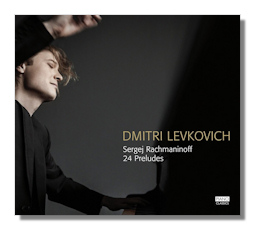
The Internet's Premier Classical Music Source
Related Links
- Rachmaninoff Reviews
- Latest Reviews
- More Reviews
-
By Composer
-
Collections
DVD & Blu-ray
Books
Concert Reviews
Articles/Interviews
Software
Audio
Search Amazon
Recommended Links
Site News
 CD Review
CD Review
Sergei Rachmaninoff

Complete Preludes
- Prélude in C Sharp minor -
"Morceaux de fantaisie", Op. 3 #2 - Ten Preludes for Piano, Op. 23
- Thirteen Preludes for Piano, Op. 32
Dmitri Levkovich, piano
Piano Classics PCL0089 70:47
When you hear the pianist's no-nonsense tempo for the opening chords of the famous C-sharp minor Prelude, which opens this CD, you suspect a briskness in pacing to follow in the main theme: it does. This is one of the faster versions of this warhorse you're likely to encounter, as even the middle section is taken more quickly than usual. But despite its alacrity the performance freshens up what can sound stale taken at traditional tempos. The ensuing F-sharp minor Prelude, #1 from Op. 23, is also played relatively briskly: this is not Largo, as the composer calls for in the score, but rather more like Andante or even quasi-Moderato. And so it goes with Ukrainian-born Canadian pianist and composer Dmitri Levkovich. He is generally quite brisk in his tempo selections for the twenty-four preludes. Only one other pianist that I know of, Sergio Fiorentino, plays them faster, but just barely: 69:56 compared with 70:47. Typically the preludes are played in the range of 75 to about 82 minutes. But don't let that drive you away from Levkovich, as most of his interpretations are well thought out, imaginative and never dull, and his technique allows him to do pretty much anything he wants.
His account of the D minor Prelude, #3 from Op. 23, may be quite fast, but Levkovich imparts a sense of agitation throughout the piece that infuses the music with passion, even if there is a trade-off where elegance and subtlety are a bit shortchanged. The ensuing D major Prelude is one work that isn't paced so briskly and it comes across with a pleasing lyrical warmth as it builds to a passionate climax. Actually, the G minor Prelude that follows is paced rather moderately as well and is quite convincing in its stately character. The C minor, #7, is effectively agitated in its nervous drive and the ensuing A-flat major is deftly energetic and bright. The Op. 23's closing number, the G-flat major, is another Largo taken a bit on the brisk side, but again Levkovich conveys the work's emotional character, in this case a sense of yearning and loss, with feeling and intelligence.
The pianist plays the Op. 32 set even more effectively, perhaps because of the livelier nature of the music and faster tempo markings by Rachmaninov. The first three pieces – the C major, B-flat minor and E major – are played quite energetically, the latter coming across ebulliently and triumphantly as Levkovich infuses the music with such effervescence and joy. The E minor Fourth is appropriately agitated and restless, and the in G major Fifth really comes on with a powerful rush of nervous energy in the latter half. #6, in F minor, is quite lovely in its quivering gentleness and lyrical charm. I could go on citing more examples of Levkovich's splendid playing, but I'll just mention a few more of what I think are his better efforts of the remaining ones in the set: the F major (#7), B minor (#10), and G-sharp minor (#12).
Obviously, Dmitri Levkovich, who now lives in Manhattan, is a talent to watch. He has won outright or captured high prizes in many international competitions and has studied at the Cleveland Institute of Music under Sergei Babayan, earning the degrees of Bachelor of Music, Master of Music, and Artist Diploma. This is Levkovich's debut recording for Piano Classics. While there are many convincing sets of the 24 Rachmaninov Preludes, featuring the likes of Ashkenazy and Laredo, to mention but two, this one by Dmitri Levkovich certainly commands your attention and augurs well for the pianist in the future. The sound reproduction is clear and well balanced and the notes informative. Recommended.
Copyright © 2015, Robert Cummings





















